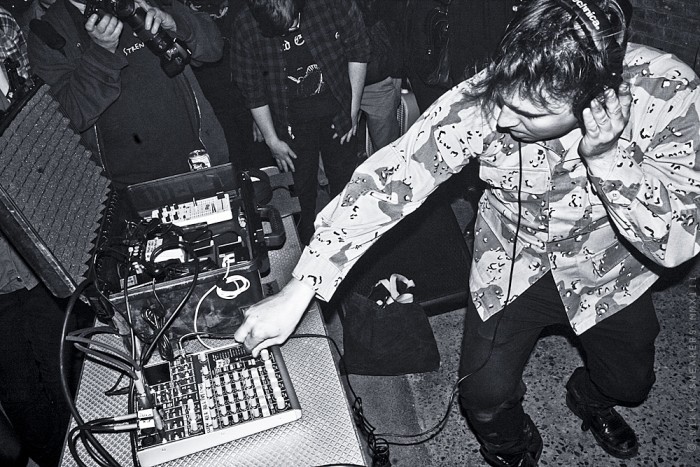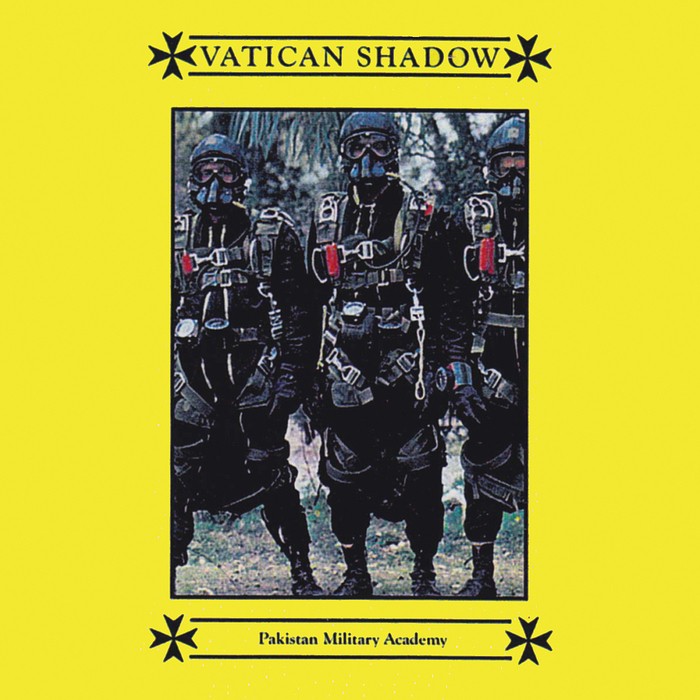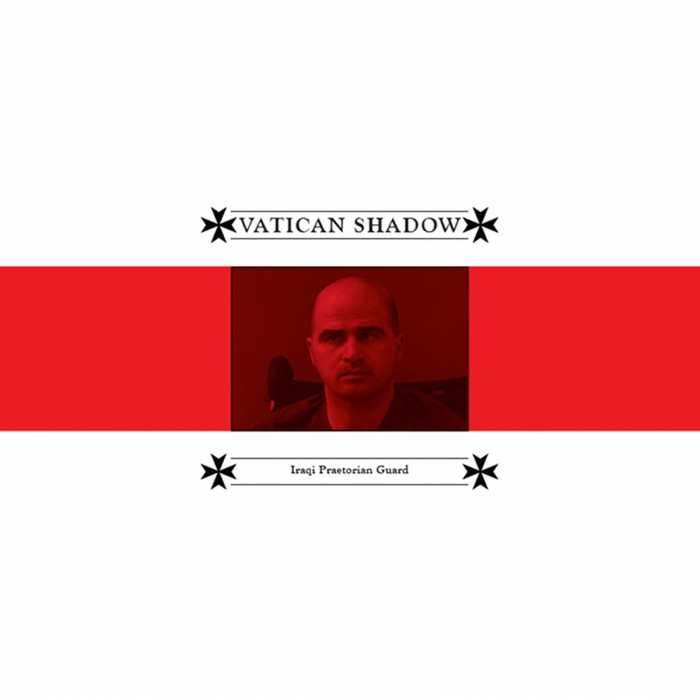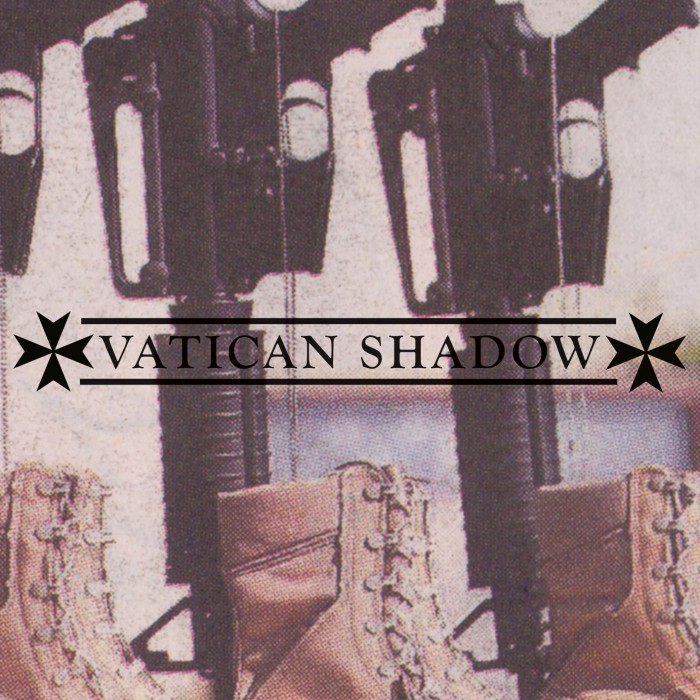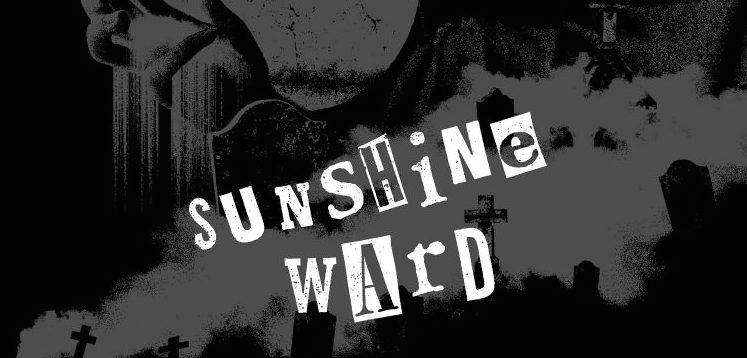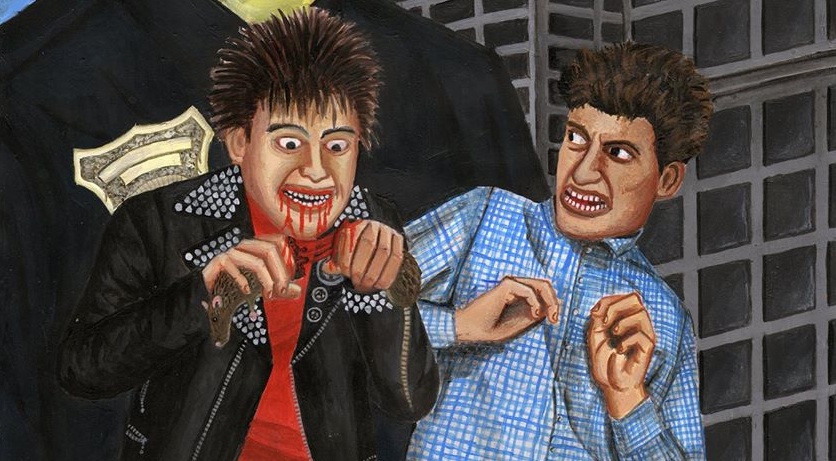A few years ago, I was sent a CD of minimalist black metal from NYC by one PM Tremblay, a chap who put out my band’s album on his Tour De Garde imprint. Lo-fi, hysterical and dwelling somewhere between the forest and the gutters in a manner reminiscent of the second wave Norwegian stuff, alongside odd elements of thrash/death metal, Ash Pool were fairly unremarkable, despite a certain idiosyncrasy which saw them gain a following amongst blackshirted BM/PE weirdos. It was with curiosity that I learned the creator was one Ian Dominick Fernow, better known as the man behind Cold Cave and Prurient, in addition to his various other sonic manifestations.
None of these projects came close to preparing me for Vatican Shadow, in which Fernow’s latent potential has finally come to fruition. Described by Hospital Productions as “Militant religious industrial. Music for assassins on the world-scale board game upon which it isn’t clear who is winning or what side you are on,” Vatican Shadow transcends the boundaries of geopolitical covert warfare and becomes a startling analogy for the confusion of existence under the yoke of present day global media. It sounds like cabalist techno-nihilism; Depeche Mode meets The Prodigy at a ketamine-fueled rave in a survivalist militia compound.
A bloody-minded singularity makes up of the chassis of each release, unsettling ambient elements roaming the hinterlands while eclectic beats inform each track with intent. This music transcends the limitations of black metal, noise and power electronics, which the creator’s Hospital Productions label had been a by-word for since the late ‘90s. With over a dozen previous musical incarnations, one suspects that something with the impact of Vatican Shadow was always the intention, conscious or not.
Its creator has, for the most part, remained silent about the project. Invited to comment, Fernow responded with a cheerily polite and simple, “Thanks for writing. Unfortunately I don’t do interviews as Vatican Shadow for conceptual reasons related to the project. I feel that ‘silence’ is essential to the presentation of these themes to allow room for the audience’s own interpretations. Thanks for the invite however!”
For nothing further needs to said. This is a conscious retaliation against the overly-mediated times we live in, during which fame is an end in-and-of-itself, and meta-narratives encapsulate even the most banal of events. In Vatican Shadow, inspiration and song titles are explicitly derived from obscure and haunting newspaper headlines concerning terrorism involving U.S. interests. Most of this relates to the world pre- and post-9/11, with recent releases widening the lens in reference to David Koresh and Timothy McVeigh. Providing obtuse context, Fernow has even released a number of cut and paste fanzines pertaining to the project. Each song is instrumental and there are never any vocals.
2014 was Vatican Shadow’s most prolific year since 2011, a raft of recent releases developing the project and taking it to a more minimalist, darker sphere. These more distorted yet still peacefully unsettling beat-driven soundscapes hint at a new era in Vatican Shadow’s development. 2010 was the genesis of the band with the Byzantine Shadow CIA tape, a fairly basic introduction, ‘Cairo Sword Unleashed’ and ‘Gunmen With Silencer’ nevertheless hinting at the greatness to come. In contrast, witness July 2014’s three song Enduring Mysteries EP. Opener ‘F.B.I. God’ is deeply unsettling in its medicated sense of control bunker proxy warfare, its counterpart and closing track ‘Koresh Babylon’ scaling the techno factor up a notch as it marries solemn drones to a thumping, skittish beat in one of VS’s most danceable tracks to date.
Compare this to the more reticent earlier era, of which Pakistan Military Academy (2011) is a masterpiece; try running EP opener ‘Whitewashed Compound Stealth Helicopter Crash’ through a decent stereo at 100db and you almost expect the blissfully exultant synths to burst forth into a deep house dancefloor anthem. It doesn’t. It maintains this level of euphoric tension for almost five minutes before segueing into a drugged-out utopian paradise of ominous gorgeousness. The remainder of the EP degenerates into basic paranoia, sequentially less pleasant and engaging as it progresses.
Ghosts Of Chechnya from 2012 is a further highlight. The sultry ebullience of the sounds in ‘Voices Came Crackling Across A Motorola Hand-Held Radio’ are frozen in a stark pre-ecstatic moment, ready to emerge but never quite revealing itself. It catches on a loop, remaining tense, beckoning. Amidst the clamour, ‘Peace Rage’ attacks with a furious pulse, a certain X-Filesey MacGyverian flavour colliding with the song’s steady non-progression, sorrowful synths and off-beats breaking through and adding up to a conspiracy you can almost see yourself believing.
What really transports Vatican Shadow to the next level (with a black bag over it’s head in some extralegal zone via a non-commercial airport) is its sense of hopefulness; I like to think that this is the moral/religious impulse amongst the combatants, be they Hezbollah militants on a Jihadic quest to attain infinity virgins, or private military contractors seeking the glory of stupendous wealth by invoking the Rapture for conservative Republican interests. Either way, it’s wonderfully bonkers.
Compare this fruitful thematic focus of Vatican Shadow to underground trends of recent years. Myriad leftfield releases in the realm of synth-based music have emerged from unexpected sources, united by their general opaqueness. I’m sure your local scene is no different to mine – in Melbourne, on one side of the equation we have the darker emanations: Lakes and Täx with their gloomy postpunk, Dead Boomers’ dour power electronics, Nun’s melodramatic new wave and a breathless, tragically gloomy take on ‘80s goth/pop from White Hex. Like Vatican Shadow, each of these acts have emerged from the more conventional end of the underground noisy guitar scenes with whom they regularly share stages, and thematically, all are hard to pin down.
At the other end of the scale are the synthier manifestations: Forces presenting a polished, moody approach to krautish industrial techno, Standish/Carlyon camp and sultry debut, their 2013 LP eschewing the foppish alt-indie country pop of the members’ previous incarnation, while the associated HTRK pursue a separate but similar path all of their own. All these bands have three things in common – considerable talent, a background which differs from their current manifestation, and a reluctance to be pinned down to a specific thematic focus.
Which brings us back to our point: mediation. Synth-heavy music has generally been vague and without explicit intention in comparison to its brasher, brattier cousins from the guitar-based underground. Whereas noise and power electronics have never been shy to craft a delicious subterfuge from their pre-sonic aesthetics, dance music has rarely shared such depth, with non-sonic signifiers regularly seeming little more than an afterthought. Vatican Shadow combines both in a tour-de-force of contextual splendour…and in the process, reveals an interesting response to the dour and monochromatically curated world of 2015.


